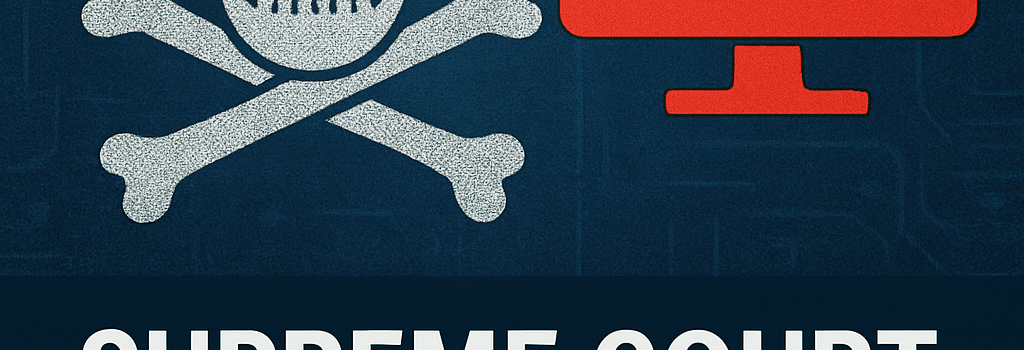Supreme Court Considers ISP Liability for Piracy

The US Supreme Court has agreed to hear Cox Communications v. Sony Music Entertainment, a landmark case that could determine whether Internet Service Providers (ISPs) must disconnect subscribers accused of copyright infringement. The decision has far-reaching consequences for network management, user privacy, and the scope of safe-harbor protections under the Digital Millennium Copyright Act (DMCA).
Background: From a $1 Billion Verdict to a New Trial
In the original trial, Cox faced a jury verdict of nearly $1 billion in statutory damages after Sony Music alleged the ISP willfully contributed to mass piracy. In February 2024, the Fourth Circuit Court of Appeals overturned that figure on the grounds that Cox did not directly profit from subscriber infringement. However, the appellate court found that Cox engaged in willful contributory infringement by failing to terminate repeat offenders, ordering a fresh damages hearing.
Key Legal Question
The Supreme Court will consider whether an ISP can be held liable for “materially contributing” to infringement simply by ignoring notices that identify IP addresses repeatedly linked to Torrents and other peer-to-peer (P2P) protocols. At issue is the interpretation of DMCA safe-harbor §512(i): must an ISP proactively sever service upon receiving allegations, or only when it has actually fostered or endorsed infringing activity?
Technical Implications for Network Infrastructure
- Deep Packet Inspection (DPI): Some ISPs deploy DPI to identify P2P and BitTorrent traffic by inspecting packet headers and payload signatures. Mandating disconnections could incentivize broader DPI adoption, raising privacy and net neutrality concerns.
- IP Address Management: ISPs allocate dynamic IPs via DHCP. Notices often cite a timestamp and an IP, but without subscriber logs or real-time correlation, accurately matching infringing traffic to a user can be error-prone.
- Automated Notice Handling: Rights holders use bot-driven crawlers to scan swarms and issue millions of takedown notices annually via the Copyright Alert System. ISPs argue that false positives are inevitable without human validation.
Impact on ISP Operations and End Users
- Network Policing vs. Neutrality: Enforcing disconnections could push ISPs into a de facto surveillance role, scrutinizing customer traffic for infringement.
- Collateral Damage: Terminating a household’s service penalizes all occupants for a single user’s alleged conduct, potentially breaching consumer-protection statutes.
- Scalability Challenges: Processing and adjudicating millions of notices requires robust backend systems, incident tracking, and customer-support workflows.
Expert Opinions
“If the Court rules that knowledge alone triggers liability, ISPs will be forced into a constant arms race with copyright owners’ detection bots,” says network policy analyst Dr. Evelyn Harper of the Internet Governance Forum. “This could chill legitimate P2P innovation and strain consumer trust.”
“A balanced ruling should uphold the DMCA’s safe-harbor framework, requiring proof of active encouragement rather than passive knowledge,” adds intellectual property attorney Marcus Lee at TechLaw Solutions.
Additional Legal Context and Future Precedents
Other circuits have split on the issue: in October 2024, the Fifth Circuit ruled against Grande Communications for failing to act on infringement notices. Meanwhile, last month Frontier Communications settled quietly with major labels. A Supreme Court ruling will likely set a uniform national standard, influencing how ISPs draft terms of service and respond to DMCA notices.
Looking Ahead: Policy and Industry Responses
The FCC is monitoring the case for its implications on broadband policy and network neutrality. Industry groups such as NCTA and the Computer & Communications Industry Association (CCIA) have filed amicus briefs urging caution, warning that mandatory disconnection policies could undermine universal service goals and widen the digital divide.
The Court is expected to hear oral arguments in the fall term and issue a decision by mid-2026. Stakeholders across the tech ecosystem will be watching closely: the outcome may reshape the balance between copyright enforcement and open Internet principles for years to come.